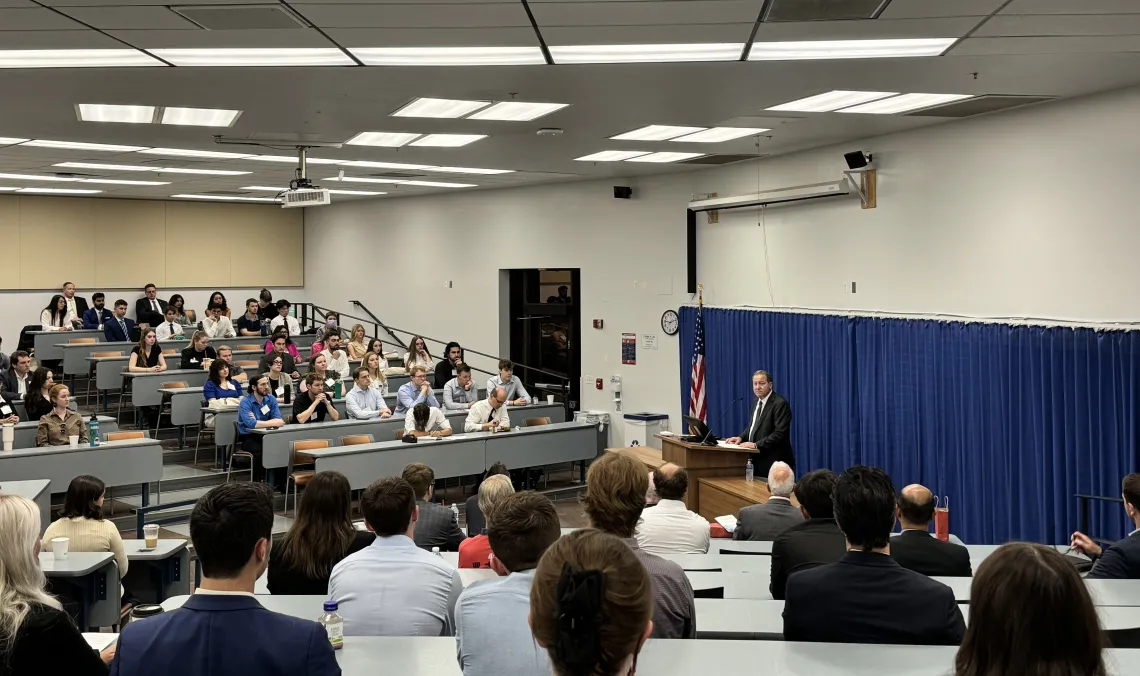University of Arizona Law Welcomes Notable New Class of LawCats

The University of Arizona James E. Rogers College of Law welcomed new faces to campus this August – in Arizona, online and abroad – kicking off the college’s 109th academic year.
A diverse group, the combined JD and Advanced JD entering class includes 111 students representing 53 undergraduate institutions, 23 states, 3 Native Nations, and 8 countries.
Women make up half of the incoming JD class, and 32% of the class are students of color. This year’s entering JD class is also among the strongest academically in the college’s history with a median LSAT score of 163 and a median GPA of 3.78. The incoming JD class also reflected changes in legal education, with students admitted on the basis of GRE and JD-Next scores, in addition to the traditional LSAT. And, thanks to the continued growth of the Navajo Law Fellowship Program, which offers support to Navajo students attending the college, this year’s JD class includes three students from the Navajo Nation.
The JD class is joined by more than 1,800 undergraduate students who are pursuing a BA in Law degree, the first undergraduate law program in the U.S.
The reach of the BA program extends well beyond the U.S. borders. This fall there are more than 600 students working towards the BA in Law at our microcampuses – Ocean University in Qingdao China, American University Phnom Penh and Hanoi Law University. Students in each of those programs will earn a BA in Law from the University of Arizona and a law degree from their home institution.
Graduate education at University of Arizona Law continued to expand this year, attracting students from around the world to advance their skills. The Masters of Laws (LLM) program welcomed seven students to the General LLM and four to the International Trade and Business Law LLM. One of these new LLM students is already a double University of Arizona Wildcat, having graduated from the BA in Law program at American University, Phnom Penh and also completed her JD.
In addition, two LLM students, five Doctor of Juridical Science (SJD) students, and five Native JD students joined the Indigenous Peoples Law and Policy (IPLP) program. The LLM and SJD IPLP students join us from five different countries (U.S., Tanzania, Kazakhstan, Taiwan and New Zealand) and three different Indigenous communities (Maasai, Māori, and Paiwan).
The college also welcomed a strong and diverse class of new Master of Legal Studies (MLS) students, admitting 123. The vast majority of these students will be pursuing the degree online, while 20 will join us on main campus here in Tucson. Among the MLS class, 70% are women and 66% identify as diverse. Thirty members of the class hold prior graduate degrees. Twenty-seven members of the fall MLS cohort and 11 from the summer cohort are participating in the Legal Paraprofessional (LP) concentration.
Graduate certificates in Health Law admitted 19 new students for fall 2024. With the inclusions of this semester’s new cohort, more than 381 students have pursued their certificate. In total, more than 1,650 students have enrolled in the Health Law & Policy program since its launch in 2019.
As a whole, 20% of the new class are the first in their families to attend college and many more are first-generation law or graduate students. Joining us with a broad range of professional and educational backgrounds, the class includes collegiate athletes, teachers – both kindergarten through twelfth grade and at the university level, musicians, journalists, veterans and current military members, a podcaster, a former campus bus driver and a board game designer.
“All of us in this learning community, students, and faculty and staff, must work to balance the challenge of learning this new art and science, and high expectations of each other, with pervasive support and a powerful sense that we are in this together,” Arizona Law Dean and Ralph W. Bilby Professor of Law Marc L. Miller told new students during their orientation program. “For those of you new to the law, this will be challenging. For those of you who have been lawyers in another country, or here in the U.S., it will be challenging as well. The standards here, at this great law school and this extraordinary university, are exceptionally high. Yet the standards for humanity and decency and love are exceptionally high as well.”
